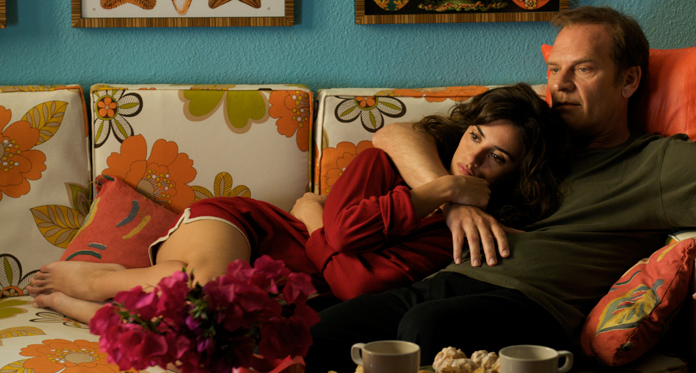Film noir is a genre that has become synonymous with
the 1940’s and 1950’s. When they were first released, the thrillers, mysteries,
and melodramas that compose the versatile genre were often pushed aside as
‘popcorn fare’ that were only produced to satisfy studio budgets. As time wore
on, however, the gritty style and moral complexity of those forgotten films was
finally recognized by new generations who saw the anxieties and broken hopes of
their own era reflected back at them on the black and white screens of the
past. Today, the genre has been hailed as both cutting edge and classic and is
regularly, though rarely successfully, imitated. One film that successfully
manages to blend the moral crises and dark sensibilities of noir with the
issues and norms of contemporary society is the 2009 Spanish neo-noir Broken Embraces.
 |
| So familiar, but I can't think why.... |
The story begins with blind screenwriter Harry Caine
(Lluis Homar) learning about the death of the producer of one of his films,
tycoon Ernesto Martel (Jose Luis Gomez). Soon after this revelation, Harry’s
agent approaches him with a new client, an amateur director known only as ‘Ray
X’ (Ruben Ochandiano). Harry later realizes that Ray X is actually the alias of
Ernesto Martel’s son, Ernesto Jr. The film then launches into a flashback to the
early 1990’s when Harry still possessed his sight and was a director named
Mateo Blanco who wrote screenplays under the pseudonym Harry Caine. Mateo is
approached by Ernesto, who agrees to finance Mateo’s latest project, a comedy
called “Girls and Suitcases”, in hopes of securing a role for his secretary
turned mistress, Lena (Penelope Cruz). Mateo reluctantly allows Lena to
audition only to find himself almost instantly captivated by her, and despite
her lack of professional experience, he immediately casts her, leading the two
to quickly embark upon an affair. Suspecting that something is amiss, Ernesto
enlists the aid of his film loving son to spy on the pair under the guise of
filming a documentary about the making of “Girls and Suitcases”. Ernesto Jr.
soon finds the evidence that his father is seeking, leaving Lena to face the
wrath of the increasingly abusive Ernesto Sr. The film then chronicles the
tragedy that results when the lives of Mateo and his cast and crew intersect
with those of the Martels.
Director Pedro Almodovar expertly pays tribute to film
noir without resorting to blatant imitation. The film’s tone appropriately
alternates between suspenseful and mournful, while still maintaining moments of
wry humor. Rather than the stereotypical lights and shadows associated with the
genre, Almodovar instead infuses the film with explosions of vibrant color. In
this way, the film follows in the footsteps of such classics as 1945’s Leave Her To Heaven in its portrayal of
the evil that lurks within broad daylight. The characters follow noir
archetypes while still remaining entirely modern and believable. For instance,
Lena enters the film with a femme fatale’s allure, but is later revealed to be
using that same sensual charm to mask her tortured past and prison-like
present. Similarly, Mateo, while an unabashed ladies’ man is decent at heart,
and like many a noir hero, finds himself lost in the world of love, lust, and
obsession that Lena’s presence transforms his life into. Finally, the ruthless
Ernesto’s inhuman cruelty and all too human motivations earn him a place
alongside the most infamous villains in the genre. The film also pays tribute
to classic films outside of noir with Lena donning costumes that are direct
references to such icons as Audrey Hepburn and Marilyn Monroe and Mateo viewing
films that feature such classic stars as Ingrid Bergman and Jeanne Moreau. The
story also includes a sly nod to Almodovar’s own early work with “Girls and
Suitcases” serving as a clever stand-in for his hit comedy Women on the Verge of a Nervous Breakdown, making the film a treat
for cinephiles both classic and modern.
 |
| Rainy days and Mondays always get them down |
The cast provide uniformly excellent performances that
weave an edgy mystery with a retro twist. Lluis Homar makes for an effective
leading man, serving as the voice of reason in the film’s twisted tale, while
still portraying his character’s unique blend of world weariness and charisma.
Jose Luis Gomez is an excellent counter to Homar’s Mateo as he perfectly
embodies the desperation that his obsession with Lena reduces the otherwise
successful and powerful Ernesto to. Penelope Cruz shines in her role as the
enigmatic Lena, proving that she can play far more complex and compelling
characters than the pretty faces that she is too often limited to in American
films. Blanca Portillo, Tamar Novas, and Ruben Ochandiano lend apt support in
their roles as Mateo’s agent, Judit, Judit’s college student son, and Ray X,
each excellently portraying characters who are not what they seem.
Broken
Embraces is a film that blends the best of classic and modern
cinema to tell a truly unique tale. Its winding story relates a powerful
mystery that highlights the ways that art and creativity help us to find
meaning in life despite its many obstacles. The dynamic performances and
razor-sharp script perfectly merge to create an enticing film that could
convert even the most staunch of film critics into cinema devotees. Whether you
like your films at the forefront of innovation or bask in the nostalgia of
screenings past, your heart is bound to break for Broken Embraces.
 |
| Proving that even call girls have professional limits |
If you enjoy noir, check out my full-length noir style play, Call It Even http://www.jacpub.com/Full-Length/Ennis_CallItEven.htm




